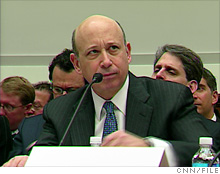Goldman 'warrants' raves from Congress
Legislators applaud news of the investment bank's 'full and fair' TARP warrant repayment, but pressure builds on Treasury to deliver more big payback checks.
 |
| Goldman Sachs CEO Lloyd Blankfein won plaudits for presenting taxpayers with a big check. |
NEW YORK (Fortune) -- Goldman Sachs gave taxpayers their due Wednesday. Now, legislators are pressing Treasury to get other banks to do the same.
Goldman Sachs (GS, Fortune 500) said it paid the government $1.1 billion to redeem the stock-purchase warrants it issued Treasury last fall. The payment marks the first time taxpayers have recovered the full value of warrants issued to a major institution under the Troubled Asset Relief Program, one expert said.
"The Goldman Sachs TARP warrant deal is the best deal that taxpayers have got to date," Linus Wilson, an assistant finance professor at the University of Louisiana at Lafayette, said in an email. "Since at least April 2009, representatives from Goldman Sachs have said that taxpayers deserve a fair return for their investments. They lived up to their word today."
The repurchase agreement comes on a day in which a congressional panel heard testimony on Treasury's handling of the TARP warrant-repayment process. The government took warrants, which give investors a right to buy a stock later at a specified price, in firms that borrowed from it last fall as a way to compensate taxpayers for the risks they took.
Herb Allison, the assistant Treasury secretary for financial stability, told the House Financial Services subcommittee on oversight and investigations that the Goldman deal was "a very fair price" for taxpayers.
"That sounds pretty good," said Rep. Dennis Moore, D-Kansas, said of the 23% annualized return taxpayers got on their $10 billion investment last fall in Goldman, "but is it good enough?"
The panel is due to hear testimony later Wednesday afternoon from the heads of three government watchdog organizations: Elizabeth Warren of the Congressional Oversight Panel, Thomas McCool of the Government Accountability Office and Neil Barofsky, the TARP's special inspector general.
Some legislators wondered if Treasury has been aggressive enough in collecting taxpayers' full due from banks that have repaid their TARP loans. A July 10 report from Warren's panel estimated Treasury had recovered just 66% of the estimated value of warrants in repurchase transactions.
The problem, some legislators said, stems from Treasury's adherence to a lengthy and convoluted negotiating process with banks. Last week, Mary Jo Kilroy, D-Ohio, introduced a bill that would force TARP warrants to be sold in the open market rather than settled through private negotiations.
The negotiations, Kilroy said, have resulted in subpar recoveries for taxpayers and a lack of transparency. "Now is the time to act to close this loophole," Kilroy said Wednesday.
Allison said Treasury would consider the matter.
"We will continue to refine our process with the aim of protecting the taxpayer's investment," he said in prepared testimony.
Goldman isn't the only bank that has pressed to settle its outstanding warrants, but others seem less eager to pay full fare.
JPMorgan Chase (JPM, Fortune 500) last week waived its right to repurchase the warrants, saying it would prefer to see them auctioned in the market. CEO Jamie Dimon reportedly complained to Treasury Secretary Tim Geithner about the government's valuation methods.
Allison defended those methods Wednesday, and Wilson said the Goldman payment -- which the firm described as "full and fair" -- is in line with his own estimates.
According to Wilson's numbers, the Goldman warrants -- which gave the government the right to buy 12.2 million shares by October 2018 at $122.90 each -- were worth between $947 million and $1.35 billion at current market prices. Goldman's stock was trading at about $160.65 a share Wednesday.
The midpoint of Wilson's estimate range is $1.12 billion -- right in line with the amount Treasury and Goldman agreed to.
In contrast, U.S. Bancorp (USB, Fortune 500) -- the 12th biggest bank holding company in the U.S., according to government data -- paid just $139 million last week to settle its warrants. Wilson said that payment meant taxpayers were getting shortchanged by between $48 million and $164 million.
As pleasing as the Goldman payment is, the JPMorgan auction could set the more important precedent.
"Goldman has done very well under the bailout, and they just wanted to end their involvement," said Wilson. "Everyone isn't going to be so eager to get out quickly." ![]()
-
 The retail giant tops the Fortune 500 for the second year in a row. Who else made the list? More
The retail giant tops the Fortune 500 for the second year in a row. Who else made the list? More -
 This group of companies is all about social networking to connect with their customers. More
This group of companies is all about social networking to connect with their customers. More -
 The fight over the cholesterol medication is keeping a generic version from hitting the market. More
The fight over the cholesterol medication is keeping a generic version from hitting the market. More -
 Bin Laden may be dead, but the terrorist group he led doesn't need his money. More
Bin Laden may be dead, but the terrorist group he led doesn't need his money. More -
 U.S. real estate might be a mess, but in other parts of the world, home prices are jumping. More
U.S. real estate might be a mess, but in other parts of the world, home prices are jumping. More -
 Libya's output is a fraction of global production, but it's crucial to the nation's economy. More
Libya's output is a fraction of global production, but it's crucial to the nation's economy. More -
 Once rates start to rise, things could get ugly fast for our neighbors to the north. More
Once rates start to rise, things could get ugly fast for our neighbors to the north. More







